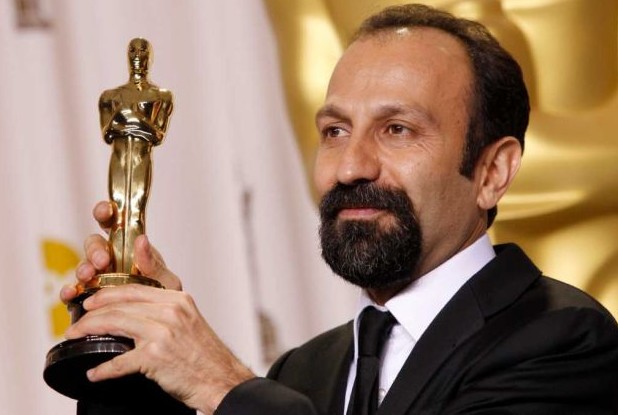Iran's "A Separation" wins best foreign language Oscar
13:26 - 27 February 2012

KURDPA - \"A Separation\" won the Oscar for best foreign language film on Sunday, becoming the first Iranian movie to win the honour.
Written and directed by Asghar Farhadi, the domestic drama focuses on a couple going through a divorce and touches on traditions, justice, and male-female relationships in modern Iran.
\"A Separation\" was regarded as the front-runner for the foreign language Oscar after sweeping the awards circuit in Europe and the United States. It also garnered an Oscar nomination for best original screenplay.
It was the second Iranian film to be nominated for an Oscar, and the first to win.
\"At this time, many Iranians all over the world are watching us and I imagine them to be very happy,\" director Farhadi said while accepting the Oscar.
\"At a time of talk of war, intimidation and aggression is exchanged between politicians, the name of their county, Iran, is spoken here through her glorious culture, a rich and ancient culture that has been hidden under the heavy dust of politics.\"
\"I proudly offer this award to the people of my country, the people who respect all cultures and civilizations and despise hostility and resentment,\" he added.
\"A Separation\" has received almost universal critical acclaim, gracing many top 10 lists for the best movies of 2011.
Made for $800,000, the film has generated more than $13 million in worldwide box office sales, according to the web site Box Office Mojo, including $2.6 million in the U.S.
Two nights before the Oscar ceremony, Israeli and Iranian artists came together in a show of peace, said Lior Ashkenazi, a star of the Israeli foreign language Oscar entry \"Footnote\".
\"At the Academy event in honour of the foreign films, we sat, spoke and all the veils came off,\" Ashkenazi told Israel\'s Army Radio. \"They are warm hearted people. We invited them to Tel Aviv and they invited us to Tehran.\"
Farhadi, who works and lives in Iran, has been reluctant to entertain theories that his film is a parable for the struggles between Iran\'s young dissidents and its paternalistic mullahs, saying it is up to audiences to take from the movie what they will.
Others have interpreted \"A Separation\" as a comment on class differences, or as a critique of Iran\'s justice system, or a clash between modernity and tradition.
Farhadi made the movie under Iranian censors who impose strictures on filmmakers in the name of Islamic morality and national morale. But he has said he was not confronted with censorship.
Award-winning Iranian director Jafar Panahi was sentenced to jail in 2010 and banned from making any more films. Farhadi has spoken up for Panahi, putting himself in the line of fire from hardliners in the Iranian government.
But Farhadi has also criticized fellow Iranians who emphasize state censorship in order to promote their movies abroad, saying they are as morally culpable as the government officials who censor them.
Written and directed by Asghar Farhadi, the domestic drama focuses on a couple going through a divorce and touches on traditions, justice, and male-female relationships in modern Iran.
\"A Separation\" was regarded as the front-runner for the foreign language Oscar after sweeping the awards circuit in Europe and the United States. It also garnered an Oscar nomination for best original screenplay.
It was the second Iranian film to be nominated for an Oscar, and the first to win.
\"At this time, many Iranians all over the world are watching us and I imagine them to be very happy,\" director Farhadi said while accepting the Oscar.
\"At a time of talk of war, intimidation and aggression is exchanged between politicians, the name of their county, Iran, is spoken here through her glorious culture, a rich and ancient culture that has been hidden under the heavy dust of politics.\"
\"I proudly offer this award to the people of my country, the people who respect all cultures and civilizations and despise hostility and resentment,\" he added.
\"A Separation\" has received almost universal critical acclaim, gracing many top 10 lists for the best movies of 2011.
Made for $800,000, the film has generated more than $13 million in worldwide box office sales, according to the web site Box Office Mojo, including $2.6 million in the U.S.
Two nights before the Oscar ceremony, Israeli and Iranian artists came together in a show of peace, said Lior Ashkenazi, a star of the Israeli foreign language Oscar entry \"Footnote\".
\"At the Academy event in honour of the foreign films, we sat, spoke and all the veils came off,\" Ashkenazi told Israel\'s Army Radio. \"They are warm hearted people. We invited them to Tel Aviv and they invited us to Tehran.\"
Farhadi, who works and lives in Iran, has been reluctant to entertain theories that his film is a parable for the struggles between Iran\'s young dissidents and its paternalistic mullahs, saying it is up to audiences to take from the movie what they will.
Others have interpreted \"A Separation\" as a comment on class differences, or as a critique of Iran\'s justice system, or a clash between modernity and tradition.
Farhadi made the movie under Iranian censors who impose strictures on filmmakers in the name of Islamic morality and national morale. But he has said he was not confronted with censorship.
Award-winning Iranian director Jafar Panahi was sentenced to jail in 2010 and banned from making any more films. Farhadi has spoken up for Panahi, putting himself in the line of fire from hardliners in the Iranian government.
But Farhadi has also criticized fellow Iranians who emphasize state censorship in order to promote their movies abroad, saying they are as morally culpable as the government officials who censor them.



